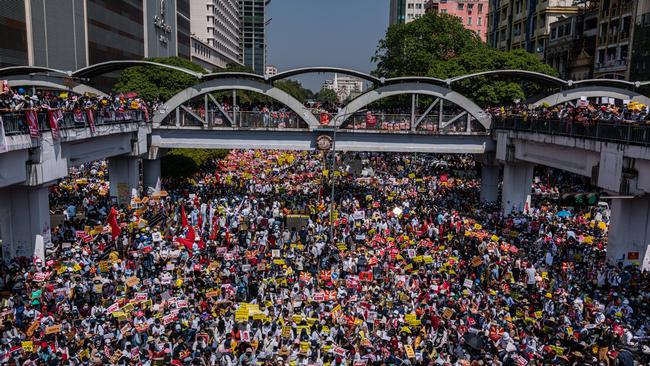Myanmar a test for Quad to act while ASEAN split
Japan, India, Australia and the US were scheduled to meet virtually amid a regional divide over how to respond to the coup.

As ASEAN dithers over how to respond to the Myanmar crisis, a meeting of Quad nations is a key test of whether the club of four democratic nations can expand its charter beyond its role as a regional counterweight to Chinaby finding a strong, united position against the coup, analysts say.
The foreign ministers of Japan, India, Australia and the US met virtually on Thursday for the first time under the Biden administration, amid a regional divide over how to respond to the Myanmar military coup that toppled the democratically elected government of Aung San Suu Kyi on February 1. The Quad’s leaders are expected to meet virtually within the next few months.
Indonesia has been pushing hard for a meeting of ASEAN foreign ministers to discuss the crisis, with little evident success so far as the regional grouping remains split over how to respond.
But with Myanmar coup leaders digging in and a popular civil disobedience movement showing no sign of abating, Lowy Institute Power and Diplomacy Program director Herve Lemahieu said there was a growing risk of the crisis ossifying and even spreading into a geopolitical proxy conflict.
Three of the country’s heavily-armed ethnic insurgent groups have now issued statements against the coup, the most recent on Thursday by the Kachin Independence Organisation — the political wing of one of the country’s largest and most professional insurgent armies.
The Kachin independence army is believed to procure many of its weapons from Beijing.
“This is a moment for the Quad to prove it does more than just function as a counterweight to China but as a club of democracies will stand up for democratic principles and democracies in peril in the region,” Dr Lemahieu told The Australian.
“It will also be a test of how well President Biden can co-ordinate and corral partners and allies to come up with joint positions on critical issues.
“If you can’t come up with a joint position on Myanmar, it could be difficult to do so on even more sensitive issues.”
Japan was “absolutely key” to any regional response because of its considerable investments in the country and longstanding relations with both the civilian and military authorities, though it traditionally preferred quiet diplomacy to loudspeaker diplomacy.
India too would be a critical player though it was doubtful whether New Delhi, which shares a border with Myanmar, would risk counter-terrorism co-operation, or key infrastructure projects such as the India-Myanmar-Thailand highway, by adopting similar punitive measures to those the US has imposed on coup leaders, their families and business interests.
“(There will be) no sanctions for sure — Japan is also not in favour — but given public statements in support of democracy … there is likely some nudging already underway,” one Indian analyst told The Australian.
Aaron Connelly, a research fellow at Singapore’s International Institute for Strategic Studies, said there was likely closer alignment between Quad members on China than on Myanmar.
“This would be a real challenge for the Quad to take on,” though both India and Japan had already gone beyond their comfort zones by signing statements of condemnation issued by the UN Security Council and G7, he added.
Mass street protests have spread to more than 320 townships across Myanmar in recent days as hundreds of thousands of people have demanded the release of almost 500 detainees and the restoration of the Suu Kyi government.
Independent Myanmar analyst David Mathieson said that was likely a greater concern for the military than the condemnation of armed groups “who can always be bought off”.
Still, he added; “If the military crackdown started to get really bad then maybe groups like the KIA would feel forced to act because if they don’t they will be condemned.”
Wednesday’s rally was among the biggest yet, in response to a call from the former ruling National League for Democracy party to protest Mr Suu Kyi’s detention and trial on trumped-up charges of illegally importing walkie talkies and breaching COVID protocols.
Soldiers and police fired slingshots, rubber bullets and stones at demonstrators in Mandalay and fired shots into a compound of striking railway workers. The military justified its actions by saying it was “trying to make sure people have tranquillity and sound sleep”, even as it continued its ongoing night arrests.
The civil disobedience movement opened a new front on Thursday when hackers attacked Myanmar military-run government websites, following a fourth consecutive night of internet shutdown.
A group called Myanmar Hackers disrupted multiple government websites including the Central Bank, the Myanmar Military’s propaganda page, state-run broadcaster MRTV and the Food and Drug Administration.




To join the conversation, please log in. Don't have an account? Register
Join the conversation, you are commenting as Logout